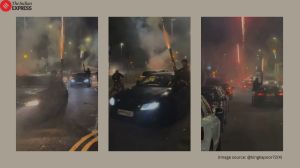Women find it easy to identify with `Sonabai’
MUMBAI, February 27: If crowds are any indication of the way the vote might swing at tomorrow's election, the Shiv Sena-Bharatiya Janata par...

MUMBAI, February 27: If crowds are any indication of the way the vote might swing at tomorrow’s election, the Shiv Sena-Bharatiya Janata party (BJP) should have little to worry: for their rally three days after Sonia Gandhi’s at Shivaji Park was as impressive. And while the controversy over the numbers rages, it is almost certain that everyone at the Sena-BJP rally was their committed voter while not all at Sonia’s were hers.
So why did Sena supremo Bal Thackeray and Gopinath Munde exaggerate figures and indulge in one-upmanship vis-a-vis a relative political non-entity?Perhaps the poor and women of Maharashtra might have the answer. Sonia Gandhi has today become the `Sonabai’ for the Marathi masses who have thus adopted her as their own. It is this state which has given her her biggest crowds yet. And they all came to see `Sonabai, Indirabai’s soonbai (daughter-in-law)’.
Ironically, her Shivaji Park rally had a large proportion of Shiv Sainiks, who came out of sheer curiosity to listen to and see thelatest phenomenon on the Indian political scene. There were also the floaters, like Janabai, a domestic employed by several households in Mumbai North, who later asked one of her employers for the election symbol of “Sonabai”. Asked why, she said all that she had received in the last few years were a demolished home and rising prices. “Now that Indirabai’s (Indira Gandhi)’s soonbai is here we think she might do something for us,” she said.
This is a reaction that seems to run in a fair proportion in the slums as well as high rises of Mumbai.
For example, Ela Mukherjee, a voter in Mumbai South whose future rests on the crucial Rent Control Bill, had already decided to cast her lot with those who might protect tenants rather than support the interests of landlords. But she feels better about her choice with the entrance of Sonia Gandhi “who is keeping up the tradition of the family. After all, the Nehru-Gandhis have made so many sacrifices for the country,” she says.
Having voted at every electionsince Independence and despite living in a high rise, as a senior citizen she feels almost as deprived as Janabai. Rising prices and the fear of being dishoused by the current government’s policies are common to both women across the spectrum of the social divide. And like Janabai, Mukherjee, too, welcomes the breath of fresh air that Indira Gandhi’s daughter-in-law seems to bring in with her. To Mukherjee, though, a generation ahead of “Sonabai,” Sonia Gandhi is just “Sonia”.
It is reactions like these that have enthused the Congress in Maharashtra, particularly since the results of the first phase of voting indicated that there was an increase in polling percentage in constituencies visited by Sonia on her whirlwind tour of Maharashtra. And that those making up the extra numbers were mostly women, Muslims, tribals and poor.
However, while there was a Muslim turnout at Sonia’s rallies in the rural areas, there was little evidence of it in Mumbai, populated largely by settlers from Uttar Pradesh andBihar. But even if many of them would have wished to see and hear Sonia, unlike the Shiv Sainiks, they did not dare to make tracks to her rallies, says Mohammad Mian, who runs a bread shop under a tree a few metres from a Sena shakha.
Shiv Sainiks had burnt his little stall during the 1992-93 riots. He had had to disappear for several weeks. He was back though and resumed business with the same kind of grit and determination that is the hallmark of Mumbai’s richer entrepreneurs.
However, after the Sena-BJP alliance came to power in Maharashtra, Mohammad Mian, though left in reasonable peace, has had constant reminders of who rules the roost. Although the aggression among Shiv Sainiks is less, Mohammad Mian has to earn his living in the shadow of a Sena blackboard posting the prices of essential commodities: a constant reminder to his customers that his is a Muslim enterprise and they have the choice to buy Hindu. Lately, the sainiks have planted a flagstaff next to the shop he painfully rebuilt under thevery same tree. Atop, it flies a Sena standard.
When Sonia was addressing her rally, he was offering namaaz: the Sena allows him and his brothers to hold their prayers in peace even through the difficult days of Ramzaan. So he decided not to push his luck. And not even off the record will he indicate his choice. “That is our secret. We have the right to vote. But you do not have the right to ask,” he admonishes. Then he adds wistfully, “I would have liked to hear Sonaji, though.”
Mohammad Mian is from UP. He came to Mumbai when he was 15. Today he is 44. It is not surprising, then, that he has crossed the Maharashtrian name for Sonia with his own term of respect for a leader.





- 01
- 02
- 03
- 04
- 05


























